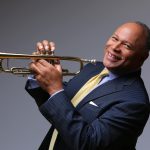Bel Canto offers peace, justice from Britten and Mechem
“Those who want freedom without struggle .. want crops without plowing .. want the ocean without its mighty roar. There is no peace without justice.” Eric Greene‘s resonant baritone voice rang with authority as he sang the words of Frederick Douglas in Kirke Mechem’s Songs of the Slave. Words were at the center of the music. Mechem selected words by Whitman, Douglas, an enslaved mother and the Declaration of Independence to build his statement.
Songs of the Slave is a suite drawn from Mechem’s opera, John Brown. The opening phrases “Blow ye trumpets blow” built from a solemn stirring in the lower strings to a lyrical celebration by full orchestra and chorus – “I’ll praise my maker with all my breath” in the spirit of a 19th century hymn. A dirge followed as Greene gave an emotional reading of words by Frederick Douglas – “The song of the slave are the sorrows of his heart.” Celebration returned as a rousing spiritual “Dan-u-el.” Greene and the chorus caught the rhythm and energy and the orchestra disclosed a jazz beat just below the surface.
Soprano Mary Elizabeth Williams sang a tender recitative based upon a letter from a slave mother to her husband. Williams captured the pathos in the text with nuanced emotion – from “I want to see you so much” to loving comments on her children to her fears that she will be sold before her husband returns. The music rises and falls with the text. Williams navigated the work with poised finesse – avoiding any tendency to showcase the high notes.
The closing speech by Douglas is as full of anger, irony and discomforting oratory today as in the 19th century. Greene delivered this powerful statement with great conviction. Douglas’s speech finishes with the Declaration of Independence – “We only ask that (America) complete its own revolution.” The final words “All men are created equal” are treated as a dramatic choral amen.
In Dan-u-el, Mechem had caught the heart of American music. Ralph Vaughan Williams returned to more traditional romantic classical roots. Dona nobis pacem is a powerful choral work made greater by Vaughan Williams’ careful staging of text. Whitman wrote of the American civil war when the bugles of war “burst like a ruthless force” into church, school, home and farm; “Make even the trestles to shake the dead where they lie awaiting the hearses, so strong you thump O terrible drums – so loud you bugles blow.” Whitman spoke of the music and Vaughan Williams delivered. The thunder of bass strings and timpani supported the blare of the brass, treble winds and bright tuned percussion. This section justified massing three choruses and full orchestra for this occasion.
Whitman turned more contemplative in powerful phrases delivered by Greene – “my enemy is dead, a man divine as myself is dead.” A slow dirge in march-time backed up the Whitman’s description of a funeral procession for son and father. Greene sang the recitative with the orchestra and chorus underscoring the words and offering response. Text in the closing section is drawn selectively from Old and New Testaments reflecting Vaughan Williams’ own commitment to pacifism – “Nation shall not lift up a sword against nation .. righteousness shall look down from heaven .. on earth peace, good-will toward men.”
But the emotional heart of Vaughan Williams’ work came from short intervals voiced by Mary Elizabeth Williams of words from the Agnes Dei – “Dona nobis pacem (grant us peace)”. Her voice could match full orchestra and chorus if needed and fell to a whisper as the work closed.
The shifts of tone and emotion between the two dramatic works and within the six sections of each work were carried by the soloists. They brought just the right balance to each. Williams’ voice was rich and consistently strong across a wide range. Her emotional range was as wide. Greene’s full resonant voice served well, whether he was expressing sorrow, compassion, pleas for understanding or defiant expectations.
The evening was musically and emotionally satisfying. The works of two of the greatest contemporary choral composers served Bel Canto’s year-long commemoration of the American civil war. But both works convey a more universal message. Whitman’s works have been a wellspring for many composers. Mechem’s use of Frederick Douglas offers a critical amendment to Vaughan William’s call for peace; without justice there is no peace.
The Bel Canto expanded its forces to a size to match the orchestra by inviting the Baptist College of Ministry Concert Chorale and the Waukesha Choral Union to join them. With the full Milwaukee Orchestra the stage held more than 200 persons. In the wide auditorium of the Oconomowoc Arts Center everyone fit and the well-tuned hall delivered the sound without compromise for full dramatic sections and soloist’s pianissimo.
















